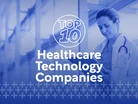Top 10: Healthcare Technology Companies

We take a closer look at the companies empowering the healthcare sector with innovative solutions, revolutionising the way the sector approaches patient care and wellness. From advanced medical devices to transformative digital platforms, these tech giants are reshaping healthcare, driving efficiency, accessibility and improved outcomes for patients worldwide.
10. Medtronic
Medtronic says it’s dedicated to advancing healthcare through a diverse array of therapies and medical devices aimed at relieving pain, restoring health and prolonging lives. With a global reach, the company claims to have positively impacted over 75mn patients worldwide. Notably, Medtronic's commitment to innovation is evident in its substantial investment of $2.7bn in research and development over the years.
Revenue: $31.227bn
Employees: 95,000
CEO: Geoff Martha
Founded: 1949
Johnson & Johnson MedTech specialises in technology and innovation within surgical, orthopaedic and interventional solutions. In 2023, the MedTech division at J&J generated approximately $27.4bn, constituting about 36% of the company's total global revenue. The primary market for the company is the US, although J&J is a multinational organisation the business generates more than half of its revenues in the United States.
Revenue: $85.159B (J&J overall)
Employees: 150,000
CEO: Joaquin Duato
Founded: 1886
8. Philips
Through advanced technology Philips provides clinical insights to help personalise the health pathway for patients. It covers areas such as diagnostic imaging and consumer health devices. With an annual investment of $1.7bn in research, the company says it remains “committed to driving innovation forward into the future”.
Revenue: 17.2bn
Employees: 37,000
CEO: Roy Jakobs
Founded: 1891
AWS provides purpose-built services and solutions for healthcare providers, healthtech organisations and payors – a person, organisation or entity that pays for the care services administered by a healthcare provider. AWS says its Health offering enables healthcare organisations “to work effectively and make data-driven decisions while reducing costs”. Organisations such as Takeda & GE Healthcare use AWS.
Revenue: $90.8bn
Employees: 136,000
CEO: Adam Selipsky
Founded: 2006
Siemens Healthineers creates technology and AI-supported digital tools that improve medical care worldwide. The company has been making healthcare products for 125 years. In 2021, the Healthineers division was the most profitable part of the entire company.
Revenue: €18bn
Employees: 66,000
CEO: Bernd Montag
Founded: 1847
5. Google Cloud
Google Cloud helps healthcare organisations innovate and advance care, through its healthcare and life sciences platform. Through data-driven innovation, Google claims to have revolutionised the patient and caregiver experience while enabling operational efficiencies across many organisations. The healthcare cloud computing market was valued at $33mn in 2021, and it is expected to reach US$D72mn by 2027, with Google being a major contributor in this upward shift.
Revenue: $9.2bn
Employees: 54,000
CEO: Thomas Kurian
Founded: 2008
McKesson Corporation's diversified solutions enhance patient access to therapies and equip healthcare facilities with technologies for improved operations. The company delivers a third of all pharmaceuticals used in North America and employs over 78,000 employees.
Revenue: $3.56bn
Employees: 51,000
CEO: Brian S. Tyler
Founded: 1833
GE HealthCare Technologies is an American multinational medical technology company headquartered in Chicago, Illinois. It was spun-off from General Electric in 2023, with GE retaining 10.24% of the business. GE Healthcare's integrated solutions and data analytics are designed to personalise and simplify patient care.
Revenue: $19.6bn
Employees: 51,000
CEO: Peter J Arduini
Founded: 1994
2. Microsoft
At the HLTH 2023 conference, Microsoft introduced new data and AI solutions to help healthcare organisations “improve patient and clinician experiences while delivering quality care more efficiently and at a lower cost”, the company said. The solutions offer healthcare organisations a unified approach to their data and AI strategy, and enable them to take advantage of the breadth and scale of Microsoft Cloud for Healthcare. An example of one of the solutions is Microsoft Fabric, which helps healthcare organisations combine data from previously siloed sources. Such data might include electronic health records, picture archiving and communication systems, labs systems, claims systems and medical devices.
Organisations including Northwestern Medicine, Arthur Health, The Ontario Workers Network and SingHealth are using the platform to advance some of their most prominent work.
Revenue: 198.3B
Employees: 221,000
CEO: Satya Nadella
Founded: 1975
1. IBM
IBM leads the charge in healthcare transformation, offering secure platforms, advanced AI solutions and digital transformation services to enhance patient care worldwide.
One use case for IBM’s is a recent project with NHS (National Health Service) Digital. The UK’s NHS sought to broaden the breadth and scale of its offerings and increase its cybersecurity preparedness and resilience. The result was an increased ability to manage and respond to cyber threats with a central source of cybersecurity intelligence for the healthcare system and partners.
Today, the NHS can proactively detect, respond to and remediate security events more quickly, effectively and efficiently. IBM monitors around 1.2mn NHS devices for cyberthreats and vulnerabilities. On average, it blocks more than 2bn malicious emails a year through targeted filtering.
Revenue: $19.6bn
Employees: 282,000
CEO: Arvind Krishna
Founded: 1911
******
Make sure you check out the latest industry news and insights at Healthcare Digital and also sign up to our global conference series - Tech & AI LIVE 2024
Healthcare Digital is a BizClik brand



